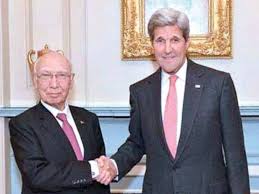The two countries agreed on the need for effective action against all violent extremists, specifically underscoring that no country’s territory should be used to destabilize other countries.
The United States expressed appreciation for the sacrifices of Pakistan’s security personnel and civilians in the fight against
terrorism and violent extremism. Both countries reaffirmed their commitment to countering terrorism including by targeting all terrorists without discrimination.
Advisor Aziz affirmed the Government of Pakistan’s resolve to take effective action against United Nations-designated terrorist individuals and entities, including al-Qa’ida, the Haqqani Network, and Lashkar-e-Tayyiba and its affiliates, as per its international commitments and obligations under United Nations Security Council resolutions and the Financial Action Task Force.
The United States and Pakistan committed to continue promoting peace, stability, and transparency in the region and to eliminate the threats posed by violent extremism and terrorism.
The two sides looked forward to the upcoming Law Enforcement and Counterterrorism working group meeting where the United States and Pakistan will work together to further bolster the capacity of Pakistan’s judicial and law enforcement authorities to enforce the rule of law and combat terrorism, including the financing of terrorism.
The two sides agreed to further enhance cooperation between their respective counter terrorism authorities. Additionally, both states emphasized the importance of efforts to enhance bilateral cooperation and information-sharing between Afghanistan and Pakistan, including through joint training, to better interdict the flow of illicit materials and narcotics.
The two sides also agreed to continue efforts to encourage the recruitment, retention, and advancement of policewomen. The two sides also emphasized the importance of strengthening Pakistan’s capabilities to more effectively counter the use of improvised explosive devices (IEDs). The United States expressed appreciation for Pakistani efforts in this regard.
The United States expressed its concern regarding U.S. citizens being held hostage by terrorist groups in the region and Pakistan agreed it would assist in every way possible with the safe return of American and other hostages.
Both sides noted the importance of U.S.-Pakistan defense cooperation, which supports shared strategic objectives relating to counterterrorism and regional stability.
Both sides underscored the importance of bilateral defense cooperation as serving their mutual interest and noted their willingness to explore new avenues to refine defense collaboration.
Both sides underscored the need for effective action against all violent extremists that threaten regional security. The United States expressed appreciation for the role Pakistan has played in helping to degrade al-Qa’ida and its affiliates.
Pakistan reaffirmed its commitment to taking action, in line with the country’s National Action Plan, to ensure that the Taliban are unable to operate from Pakistani soil.
Acknowledging the emerging terrorist threat posed by ISIL/Da’esh in the region, the U.S. and Pakistani delegations agreed that their countries should work closely together to counter this threat of mutual concern, and affirmed their commitment to combat the extremist ideology that fuels such groups.
Pakistan reiterated its firm resolve not to allow ISIL/Da’esh to develop a foothold in its territory, and the United States expressed its appreciation for Pakistan’s efforts in this regard.
The United States commended Pakistan’s role in hosting the successful 2015 Heart of Asia Conference, designed to bolster regional cooperation. Secretary Kerry welcomed Pakistan’s commitment to facilitating an Afghan-led and Afghan-owned peace and reconciliation process.
The two sides underscored the imperative of quickly catalyzing direct peace talks between the Afghan government and Taliban to end the bloodshed and preserve Afghanistan’s unity, sovereignty, and territorial integrity.
Secretary Kerry welcomed Pakistan’s calls on the Taliban to seek a negotiated settlement to end the Afghan conflict and its constructive role in establishing and hosting the Quadrilateral Coordination Group (QCG), an important regional initiative that brings together representatives from Afghanistan, Pakistan, China, and the United States to achieve the shared objective of initiating peace negotiations between the Afghan government and Taliban.
It was agreed that all members of the QCG will intensify their efforts to forge broader regional consensus in support of the Afghan-led reconciliation process as the best way to bring peace and stability to the region.
The United States commended Pakistan’s exemplary generosity in hosting one of the largest, longest lasting refugee populations and reaffirmed the U.S. commitment to humanitarian assistance for Afghan refugees, returnees, and displaced persons in the region.
The two sides reiterated their commitment to facilitate the orderly return and reintegration of Afghan refugees to Afghanistan.
Secretary Kerry and Advisor Aziz further commended the substantial progress made by Pakistan, Afghanistan, Kyrgyzstan, and Tajikistan on the CASA-1000 electricity project.
The four countries are now working together for implementation of the project by 2018. They welcomed the inaugural ceremony of the CASA-1000 project, to be hosted by Tajikistan in Dushanbe in May 2016.
Secretary Kerry and Advisor Aziz also commended the progress being made on the TAPI (Turkmenistan, Afghanistan, Pakistan and India) gas pipeline project.
They noted with appreciation the groundbreaking ceremony of the TAPI project at Mary, Turkmenistan in December 2015, which was also attended by Prime Minister Muhammad Nawaz Sharif, among other leaders. Such regional projects would greatly facilitate regional integration and cooperation.
Recognizing the opportunities and challenges presented by information and communications technologies, both countries agreed that international cooperation is essential to make cyberspace secure and stable, and look forward to continued engagement on cyber issues.
Secretary Kerry and Advisor Aziz committed to further strengthening the long-term partnership between the United States and Pakistan, built on robust cooperation across a wide range of issues and reflecting shared interests and common values.
The two sides reiterated their commitment to democracy, human rights, economic growth, and respect for international law as essential for long-term regional peace and prosperity, and agreed that the two governments would meet for the next Ministerial-Level Strategic Dialogue in 2017.
International News
Pakistan-US-Statement-4-(LAST)-WASHINGTON
